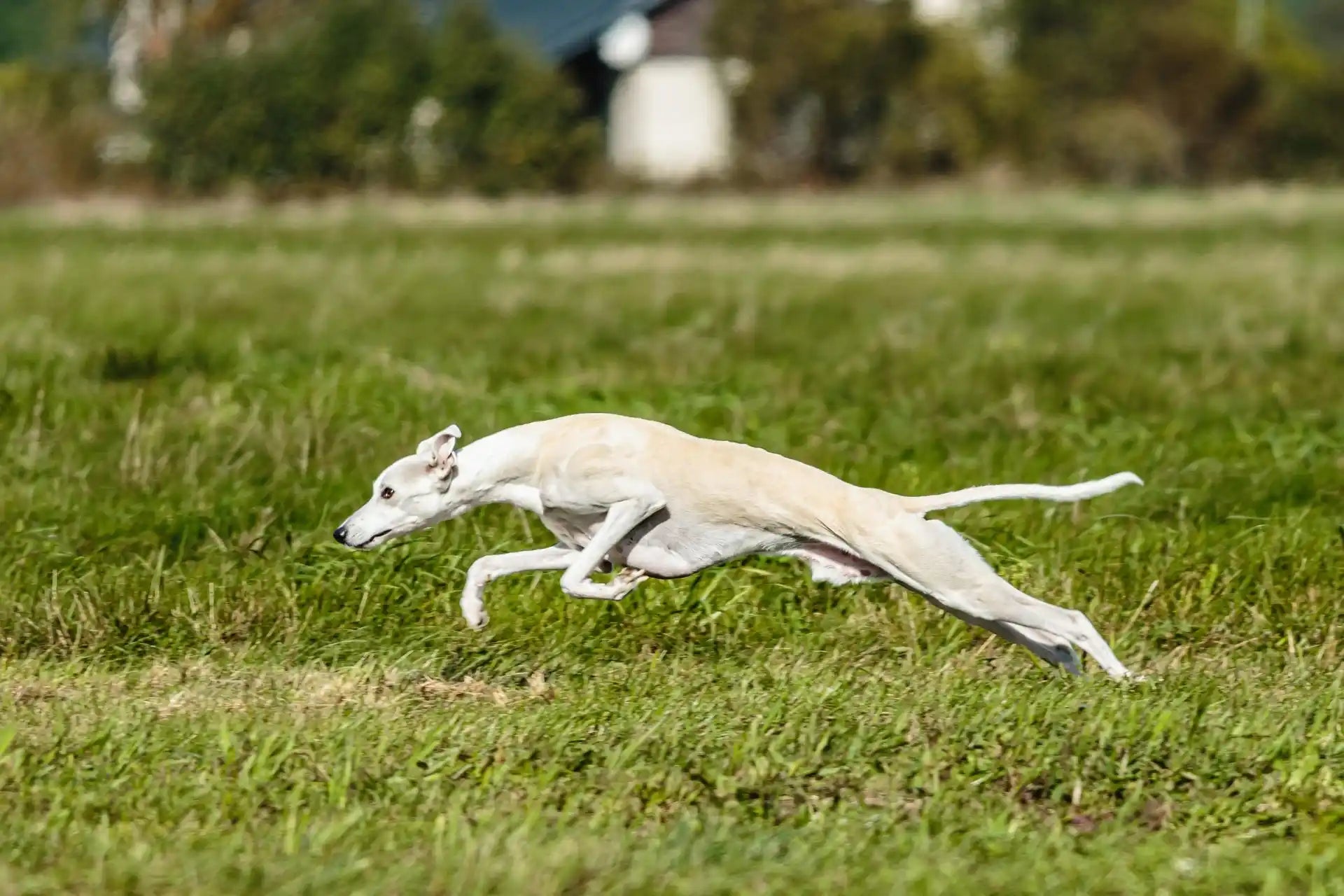
Whippet Dog Breed: Temperament, History, Care Essentials & More
The Whippet is elegance in motion—graceful, affectionate, and built for speed. Don’t let their racetrack reputation fool you; these gentle souls are just as happy curled up on the couch as they are sprinting through the park.
Perfect for quieter households or active individuals, the Whippet is a surprisingly adaptable companion.
Quick Facts Overview
|
Trait |
Details |
|
Size Category |
Medium |
|
Height & Weight |
Height: 45–56 cm; Weight: 11–18 kg |
|
Coat Type & Colours |
Short, smooth coat; various colours and patterns |
|
Energy Level |
Moderate to High |
|
Origin |
England |
|
Grooming Needs |
Low |
|
Temperament |
Gentle, affectionate, reserved, sensitive |
|
Trainability |
Moderate to High |
|
Compatibility |
Great for families, singles, and seniors |
|
Lifespan |
12–15 years |
Breed Origins and History
-
Originated in England during the 18th century
-
Bred from Greyhounds for hunting small game and racing
-
Known as the “poor man’s racehorse” due to their speed and affordability
-
Recognised by major kennel clubs worldwide
Whippets were originally bred by coal miners in northern England who needed a swift, economical dog for rabbit hunting and racing. Their name likely comes from the old English word “whappet,” meaning “a small lively dog.”
Over time, they’ve transitioned from racing fields to family lounges, thanks to their gentle temperament and manageable size.
Personality and Temperament
Key Traits:
-
Affectionate and loyal to family
-
Quiet and clean indoors
-
May be reserved with strangers
-
Sensitive to tone and handling
Whippets are calm and affectionate companions who thrive on human connection. They’re not known for barking or digging and usually prefer comfort over chaos. Their sensitivity means they respond best to soft voices and kind training methods.
Despite their love of running, most Whippets are surprisingly low-maintenance at home.
Trainability and Intelligence
Training Traits:
|
Trait |
Rating |
|
Obedience |
7/10 |
|
Focus |
6/10 |
|
Responsiveness |
8/10 |
|
Social Learning |
8/10 |
Whippets are intelligent but can be easily distracted by scent or movement. Training should be gentle and positive, avoiding harsh correction.
Start early with socialisation and leash skills, especially since their prey drive can make them bolt after moving targets.
Recommended Gear:
Exercise and Activity Requirements
Daily Requirements:
-
45–60 minutes of daily physical activity
-
Sprints in safe, enclosed areas
-
Brain games like nose work or puzzle toys
While they love to run, Whippets don’t require endless exercise. They’re sprinters, not marathoners. Short bursts of high-speed play followed by long naps are their specialty.
They do especially well in fenced yards or during off-leash park visits—just be mindful of their chase instinct.
Recommended Gear:
Physical Characteristics
-
Slim, athletic build
-
Deep chest and narrow waist
-
Long legs and arched back
-
Short, fine coat that shows off muscle definition
The Whippet’s build is all about speed and grace. Their streamlined body, combined with their agility, makes them efficient runners. Despite their athleticism, their body fat is low, so they feel the cold and need a warm bed or coat in cooler climates.
Recommended Gear by Size:
Living Environment Suitability
Ideal Conditions:
-
Quiet homes or small families
-
Apartments or houses (as long as exercise is provided)
-
Not suited to very cold environments without protection
Whippets are indoor dogs. Their low body fat and short coats mean they’re sensitive to temperature extremes. They thrive in homes where they’re part of the family and given access to cosy beds and a warm spot on the couch.
Recommended Gear:
Grooming and Maintenance
Grooming Checklist:
-
Weekly rubber mitt brushing
-
Minimal bathing required
-
Regular nail trims and ear cleaning
Whippets are one of the easiest breeds to groom. Their smooth, fine coat rarely smells and sheds only moderately. A quick brush once a week is enough to keep them tidy.
Recommended Grooming Gear:
Common Health Issues
Breed-Specific Concerns:
-
Heart murmurs
-
Anaesthesia sensitivity
-
Eye conditions (PRA, cataracts)
-
Hypothyroidism
Whippets are generally healthy but sensitive to medications and anaesthesia. Routine vet visits and a careful approach to sedation or surgery are essential. Choose breeders who screen for eye and heart conditions.
Recommended Health Support Gear:
Diet and Feeding Guidelines
Feeding Schedule:
-
Puppies: 3 meals a day
-
Adults: 2 meals daily
-
Balanced, high-protein meals without fillers
Due to their lean bodies and active metabolism, Whippets need a well-rounded diet that supports muscle tone and energy. Watch for overfeeding, as they can gain fat quickly if not kept active.
Recommended Feeding Gear:
Compatibility with People and Other Pets
Compatibility Scale:
-
Children: ★★★★☆ (gentle and quiet children preferred)
-
Other Dogs: ★★★★☆
-
Cats/Small Pets: ★★☆☆☆ (may chase due to prey drive)
Whippets are loving with people and usually get along well with other dogs. Early socialisation is key. They may not be ideal with small pets unless raised alongside them, as their natural chase instinct is strong.
Recommended Social Gear:
Behavioural Issues and Management
Common Issues:
-
Cold sensitivity
-
Separation anxiety
-
High prey drive
Solutions:
-
Provide coats in winter and indoor comfort
-
Leave safe toys and rotate activities
-
Use a long lead in open areas to manage chasing
Recommended Gear:
Essential Gear for Whippets
Walking & Outdoor:
Style & ID:
Training:
Travel & Safety:
Climate & Seasonal:
Personalisation:
FAQs: Whippet Dog Breed
1. Is a Whippet a good family dog?
Yes, Whippets are gentle, affectionate, and adaptable family dogs. They tend to be calm indoors and playful outdoors, making them a good fit for homes with respectful children and relaxed environments.
2. Are Whippets high maintenance?
Whippets are generally low maintenance. Their short coats require minimal grooming, and they have relatively few health issues. However, they do need daily exercise and don't tolerate cold weather well, so a warm coat during winter is recommended.
3. Do Whippets bark much?
Whippets are typically quiet dogs and not known for excessive barking. They may bark to alert you, but are generally calm and reserved in temperament.
4. Do Whippets like to cuddle?
Yes, Whippets are affectionate and love being close to their people. They’re often referred to as “velcro dogs” because they like to snuggle and will happily lounge beside you for hours.
5. Are Whippets destructive?
Whippets can become destructive if they’re under-exercised or left alone too long without stimulation. They are intelligent and calm by nature, but like any breed, they benefit from toys, exercise, and human interaction.
6. Can I leave a Whippet alone all day?
Whippets can be left alone for short periods, but they’re companion dogs and don’t do well when left alone all day. Long absences can lead to anxiety or boredom, so they’re best suited to households with a consistent routine or part-time companionship.
7. Are Whippets aggressive?
Whippets are not aggressive. They are friendly, gentle, and tend to get along well with both people and other dogs. They are sensitive dogs that prefer calm environments and positive reinforcement.
8. What are the disadvantages of a Whippet?
Some challenges include their sensitivity to cold, potential for separation anxiety, and strong prey drive. They may not be suited for homes with small, fast-moving pets like rabbits or cats unless raised with them from a young age.
9. Do Whippets get separation anxiety?
Yes, Whippets can develop separation anxiety if left alone too often. They bond closely with their owners and prefer consistent companionship. Early training and enrichment can help ease the time spent alone.
10. Are Whippets as lazy as Greyhounds?
Whippets, like Greyhounds, enjoy short bursts of energy followed by long naps. They are often described as “couch potatoes” once they’ve had their daily exercise. Indoors, they’re calm and restful companions.
11. What is the lifespan of a Whippet?
Whippets typically live between 12 and 15 years. With proper care, a healthy diet, and regular vet checkups, many enjoy long, happy lives well into their senior years.
Final Thoughts
The Whippet is a beautiful blend of speed and sensitivity—ideal for those who want a loyal, quiet companion with bursts of athletic energy.
Ready to care for your Whippet with top-tier gear? Check out EzyDog for trusted essentials that match your Whippet’s comfort, safety, and sleek style.




Leave a comment
This site is protected by hCaptcha and the hCaptcha Privacy Policy and Terms of Service apply.